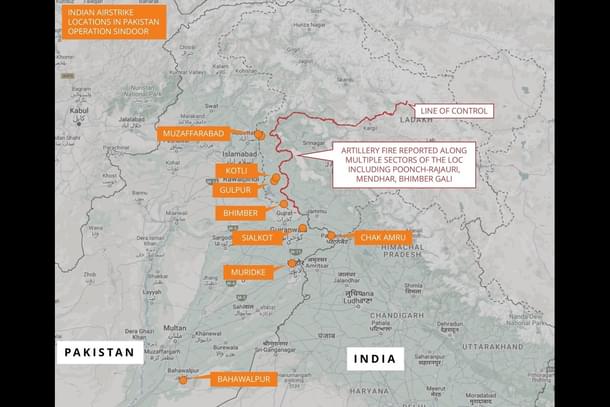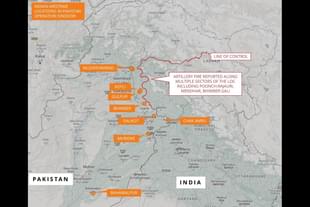News Brief
Inside 'Operation Sindoor': A Closer Look At The Nine Terror Sites Targeted By India’s Precision Strikes
Arjun Brij
May 08, 2025, 07:34 AM | Updated 07:34 AM IST
Save & read from anywhere!
Bookmark stories for easy access on any device or the Swarajya app.


In a pre-emptive counter-terrorism move, India on Wednesday (7 May) launched a coordinated precision strike operation — codenamed Operation Sindoor, targeting nine identified terror hubs in Pakistan and Pakistan-occupied Jammu & Kashmir (PoJK).
The mission was executed with clockwork precision by India’s armed forces and marked a significant escalation in New Delhi’s resolve to dismantle the infrastructure of cross-border terrorism.
The Indian Army, Navy, and Air Force jointly executed the strikes, employing advanced special munitions to neutralise key terror sites that have long operated under the shadow protection of Pakistan’s military and Inter-Services Intelligence (ISI).
Prime Minister Narendra Modi personally monitored the operation throughout the night, according to official sources.
The nine targets, all reportedly destroyed in the assault, comprised four major locations within Pakistan, ANI reported.
These facilities were central to the operations of notorious anti-India outfits such as Jaish-e-Mohammad (JeM), Lashkar-e-Taiba (LeT), and Hizbul Mujahideen (HM).
Sources revealed that Pakistan’s army, through ISI, has long been backing these groups with financial, logistics, doctrinal and military support, even providing direct combat trainings.
Many of these Markaz, or terror centres, are concealed within government premises, including health centres and educational buildings. They 9 sites were:
The Markaz Subhan Allah in Bahawalpur, operational since 2015, serves as the central headquarters of Jaish-e-Mohammad (JeM). This facility is intrinsically linked with some of the most significant terror operations against India, including the Pulwama attack of February 2019.
It houses key leadership such as JeM Chief Maulana Masood Azhar and the de-facto Chief Mufti Abdul Rauf Asghar. In addition to acting as a residence, the Markaz is used extensively for radicalisation, arms training, and religious indoctrination.
The Markaz Taiba in Muridke, established in 2000, is regarded as the premier training ground for Lashkar-e-Taiba (LeT). Located in Sheikhupura, Punjab, this facility offers religious and arms training and processes over 1,000 recruits annually.
Financed in part by Osama bin Laden, the Markaz includes a mosque and a guest house and has historically played host to international terror operatives. The perpetrators of the 26/11 Mumbai attacks, including Ajmal Kasab, were trained here.
In Narowal lies the Sarjal/Tehra Kalan facility, a JeM stronghold cleverly concealed within a government-run Primary Health Centre. Just 6 km from the international border in Samba sector, Jammu, this site serves as a key launchpad for cross-border infiltration.
The location has been used to dig tunnels and launch drones for dropping arms, ammunition, and narcotics into Indian territory.
The Mehmoona Joya facility in Sialkot operates under Hizbul Mujahideen (HM) and is located within the premises of the Bhutta Kotli government facility. This site is instrumental in pushing HM cadres into the Jammu region and provides them with weapons training and operational guidance.
In Pakistan-occupied Jammu and Kashmir (PoJK), the Markaz Ahle Hadith Barnala near Barnala town functions as a key Lashkar base. It supports infiltration into sectors like Poonch, Rajouri, and Reasi, accommodating 100–150 terrorists.
Another JeM-linked site, Markaz Abbas in Kotli, It hosts 100–125 cadres and is involved in planning and executing attacks in the Rajouri-Poonch sectors.
The Maskar Raheel Shahid facility in Kotli is among Hizbul Mujahideen’s oldest training sites. It caters to around 150–200 terrorists, focusing on specialised training such as sniping, survival in mountainous terrain, and Border Action Team (BAT) tactics.
Another major LeT training site, Shawai Nallah Camp, also known as Bait-ul-Mujahideen, is located in Muzaffarabad. It has played a pivotal role in LeT’s operational history, with attackers of the 26/11 Mumbai incident having received training there.
The facility offers religious and tactical training, with the Pakistan Army assisting in weapons instruction. Up to 250 cadres are trained here before being sent to forward launching sites.
Lastly, the Markaz Syedna Bilal, located opposite Red Fort in Muzaffarabad, functions as the primary JeM transit hub in PoJK. Hosting 50–100 terrorists at any time.
Training at this centre is bolstered by Pakistan’s Special Services Group (SSG), further cementing its role in active infiltration planning and execution.
Arjun Brij is an Editorial Associate at Swarajya. He tweets at @arjun_brij





